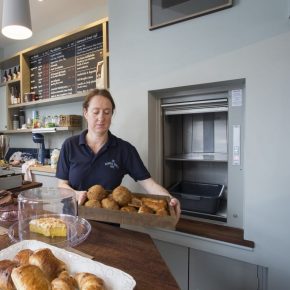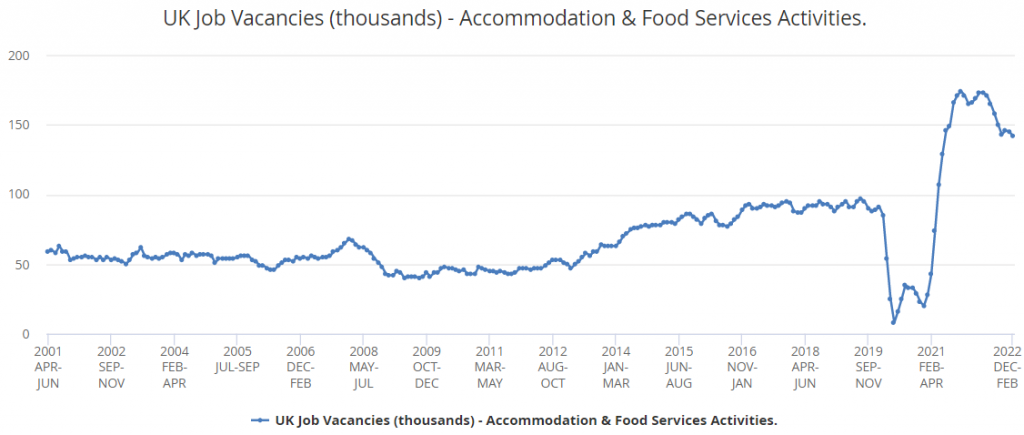
Battling staff shortages? A Stannah service lift may help
The installation of a Microlift, also commonly known as a dumbwaiter or a kitchen lift, can make even the smallest team super-efficient, says Mark Chapman, General Manager at Stannah Microlifts…
British businesses in the hospitality sector have had to deal with a dizzying array of obstacles and setbacks over the past few years. The COVID-19 pandemic, the continuing impacts of Brexit, rising inflation and the energy crisis have left many business owners struggling to cope.
One of the most difficult challenges to overcome is that of staff shortages. Data released by the Office for National Statistics (ONS) from December 2022 to February 2023 reveals that staff shortages in the accommodation and food service sector are currently stagnating at 142,000. That’s an increase of 56% compared to the pre-pandemic level of 91,000 in December 2019 to February 2020.
These pervasive staff shortages, although very slowly decreasing from the record highs of late 2021, have resulted in many commercial operators shortening trading hours or cutting the number of services or products that they offer to customers.

Fig. 1: UK job vacancies in the Accommodation & Food Services Activities sector over the last 10 years. Source: Office for National Statistics (ONS)
To deal with the issue of staff shortages, many business owners have had to seek out alternative solutions to ensure their businesses can run as efficiently as possible with fewer members of staff. These alternatives can range from complex automation solutions to other more conventional forms of technology, which, when utilised strategically, can significantly reduce the manual time and effort required for the successful completion of tasks.
One of the technological improvements that can be relatively inexpensive and simple to implement is the addition of service lifts, to the business premises. These lifts are a great way of making the movement of food, beverages, laundry, luggage and other items from one floor to another faster, simpler and more efficient, and furthermore can prevent staff injuries from carrying heavy items.
Keeping your operations running smoothly
In times of staff shortages, hospitality businesses need to make the most of every minute to ensure that waiting times for service do not drop below acceptable levels for the customer. The installation of a Microlift, also commonly known as a dumbwaiter or a kitchen lift, can make even the smallest team super-efficient, especially for food orders that need to stay warm and be delivered quickly.
A Microlift is an ideal advantage for loads that need to be moved at waist-level to make the serving and clearing of food and drinks easier and more efficient over multiple levels. For tasks that require the movement of larger items at floor-level, a trolley lift can also make the movement of roll cages, luggage trolleys and room service trolleys between floors much faster.
Protect your team’s health and safety
The risk of injury and additional staff shortages that accompany manual handling can be reduced through the installation of a Microlift, which lessens the need for manually lifting and bearing heavy items for a prolonged period of time.
Reducing the physical strain on employees can help to improve staff well-being and avoid back aches and other pains caused by manual handling. Having a service lift can also make the workplace more inclusive for disabled staff members and help reduce physical strain on workers with health problems or mobility issues.
As manual handling is such a risky business, Stannah has compiled a comprehensive Manual Handling Guide detailing how business owners can reduce the risks of staff injury and prevent further shortages due to injury
Get an efficient, tough lift in days
Many business owners may be under the impression that a service lift is expensive and disruptive to install, but this is often not the case at all. Microlifts from Stannah are compact, structure-supported and quick and easy to install. These reliable and hard wearing products are designed for operation 24/7, 365 days a year, supported by regular service visits from our expert local engineers.
So even when staff shortages bite, great service can still be provided to your customers – without the heavy lifting. With a durable and reliable Stannah lift sharing the load, your staff will be well-protected every day and able to do more than ever before.
Visit Stannah’s Service & Goods lift overview page to find out more about the different types of service lifts offered by Stannah.
Visit Supplier's page
Latest news

29th April 2025
CPD Courses Available Online From Ecological Building Systems
Ecological Building Systems, a leading supplier of natural building products for sustainable construction, has revealed its comprehensive CPD programme for the year ahead.
Posted in Articles, Building Industry Events, Building Industry News, Building Products & Structures, Building Services, Continuing Professional Development (CPD's), Information Technology, Innovations & New Products, Insulation, Restoration & Refurbishment, Retrofit & Renovation, Seminars, Sustainability & Energy Efficiency, Training, Walls, Waste Management & Recycling
29th April 2025
WindowBASE launches new prospect databases at FIT Show
Visit WindowBASE at the FIT Show to see first-hand how it helps companies find new customers – the company is launching an easy-to-use, intuitive platform on Stand G16 at the NEC Birmingham from 29th April – 1st May.
Posted in Articles, Building Industry Events, Building Industry News, Building Products & Structures, Building Services, Doors, Exhibitions and Conferences, Glass, Glazing, Information Technology, Innovations & New Products, Posts, Publications, Research & Materials Testing, Restoration & Refurbishment, Retrofit & Renovation, Windows
28th April 2025
Nuaire first UK ventilation manufacturer to use low carbon-emissions recycled & renewably produced steel
Nuaire has announced that its Magnelis® steel based ventilations systems are now being made from XCarb® recycled and renewably produced steel.
Posted in Air Conditioning, Articles, Building Industry News, Building Products & Structures, Building Services, Building Systems, Heating, Ventilation and Air Conditioning - HVAC, Restoration & Refurbishment, Retrofit & Renovation, Steel and Structural Frames, Sustainability & Energy Efficiency, Waste Management & Recycling
28th April 2025
Renderplas: Builders avoid costly remedial work with PVCu render beads
A pioneer of PVCu render beads, Renderplas is helping the construction industry avoid the costly remedial work associated with rusting steel designs…
Posted in Articles, Building Industry News, Building Products & Structures, Building Services, Building Systems, Facades, Posts, Render, Restoration & Refurbishment, Retrofit & Renovation, Sustainability & Energy Efficiency, Walls
 Sign up:
Sign up: